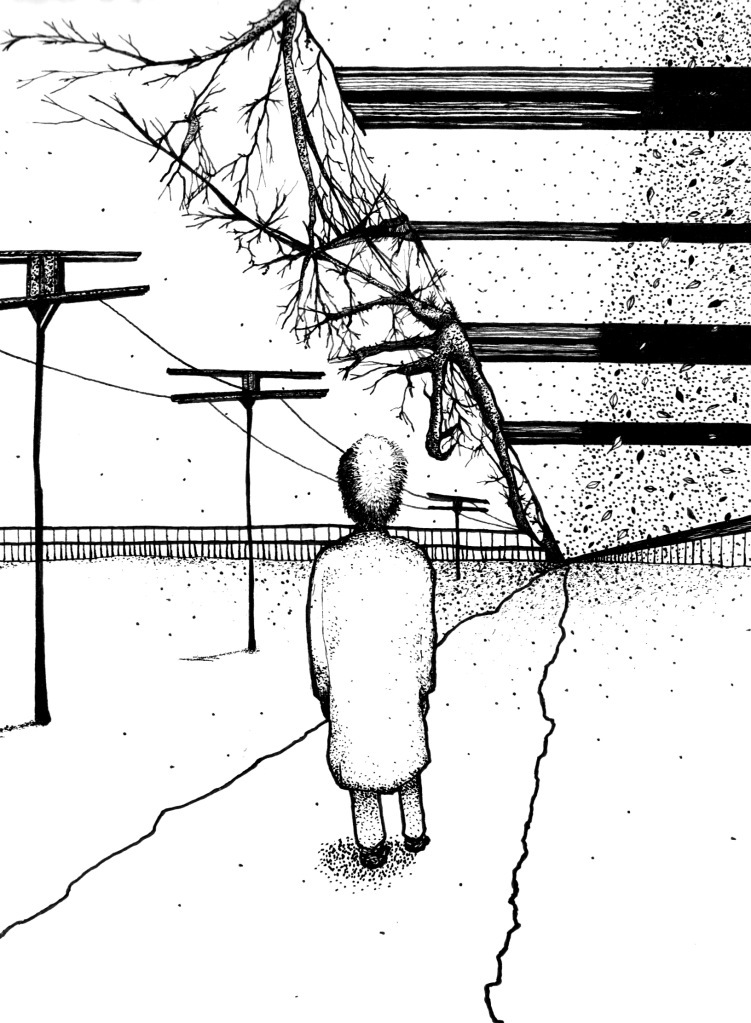UK, 2015. Documentary/ drama. Directed by Edward Kötting. With Toby Jones, Freddie Jones, Edward Kötting, Iain Sinclair, Alan Moore, Eden Kötting.

By Our Selves glances upon John Clare (1793–1864), a major poet of the English fields and forests, of solitude and loss. Channelled by the speechless Toby Jones and his father Freddie, the poet walks from his isolation in an asylum all the way to his unseen, distant home. It is a re-imagination of the 1841 journey to Northborough, which gave the author a short period of relative freedom. It is a film of (overcoming) constraints, loss, remembrance and returns. (Clare reminisced on his walk in his notes and sketches, later published under the title John Clare: By Himself.)
There is a palpable sense of distress as well as a certain degree of calm; sentiments we might experience on a lone stay in the woods and the unexceptional landscape which used to be a part of us. As pointed out in the Clare-centric episode of Melvyn Bragg’s In Our Time, the poet’s life was severely affected by a number of changes which gave birth to new limitations on his experience and thought.
First there was the ascent of physical barriers. Clare’s era, the pre-Victorian and early-Victorian years, saw a particularly strong phase of widespread land enclosure, which deprived the landless, the poor villagers, among whom the poet had grown up, of the freedom of movement in their surroundings – the woods, the fields, the venues of many a folk festival or ritual, the open space for both labour and contemplative strolls or for what could be seen as plain cohabitation with nature. It may be difficult to imagine the repercussions of the abolishment of the open field system, the brutality of the transition which encompassed diverting streams, cutting down woods and turning a great deal of human beings – and other animals – into “trespassers” in what had used to be their natural habitat. It is all the more difficult for us in Central Europe – particularly in the Czech Republic. Although we have our own history of brutal interventions in our surroundings, we are quite accustomed to the fact that the majority of the landscape, particularly the woods, are openly accessible to the locals, tourists, travellers. The notion of enclosed private spaces between our settlements seems rather odd – as in our cities, where gated communities and private streets are still seen as an anomaly.
While Clare had been physically limited in his movement around the lands he loved to experience and capture with his imagination and linguistic faculties, a further limitation came with his mental illness. Not only is the standard answer to such conditions isolation of a certain degree, Clare expresses the deeper, painful isolation of misunderstanding, of the barrier between the inmates of an institution and those deemed sane.
Edward Kötting is a singular voice in contemporary documentary film, creating visual and acoustic collages; eager to shift tones, perspectives, even genres. By Our Selves starts off as an avant-garde horror film of sorts, turning into a somewhat brooding, yet playful essay on various limitations and shades of solitude, artificial boundaries, deprivations outlining the physical and spiritual journey at hand.
Interestingly, the film itself seems unburdened by creative limitations: although the budget was probably miniscule, the production values seem perfectly adequate and what we are offered is wild, kinetic, free-spirited cinema. Paying extreme attention to soundscapes and its potential to play a major part not only in evoking certain moods, but in actual storytelling, and carefully choosing the right moments to employ simple, yet efficient mechanical camera effects, Kötting’s troupe offers an engrossing documentary essay. Before finishing with Clare’s crucial poem, I should welcome all the fans of idiosyncratic documentary – including my Czech compatriots, who found interest in the late work of Jan Němec or even Karel Vachek, who would have had a very fine time chatting with the likes of Alan Moore – to seek this one out.
John Clare: I AM!
I AM! yet what I am who cares, or knows?
My friends forsake me like a memory lost.
I am the self-consumer of my woes,
They rise and vanish, an oblivious host,
Shadows of life, whose very soul is lost.
And yet I am—I live—though I am toss’d
Into the nothingness of scorn and noise,
Into the living sea of waking dream,
Where there is neither sense of life, nor joys,
But the huge shipwreck of my own esteem
And all that’s dear. Even those I loved the best
Are strange—nay, they are stranger than the rest.
I long for scenes where man has never trod,
For scenes where woman never smiled or wept;
There to abide with my Creator, God,
And sleep as I in childhood sweetly slept
Full of high thoughts, unborn. So let me lie,
The grass below; above the vaulted sky.
(1840)
By Our Selves on IMDb: https://www.imdb.com/title/tt4629636/?ref_=nv_sr_srsg_0
By Our Selves on BFI Player: https://player.bfi.org.uk/rentals/film/watch-by-our-selves-2015-online
By Our Selves on DocAlliance: https://dafilms.com/film/9846-by-our-selves
In Our Time: John Clare (podcast): https://www.bbc.co.uk/programmes/b08cstfr
John Clare’s notes on his 1841 walk: https://dawnpiper.wordpress.com/john-clares-walk-1841/